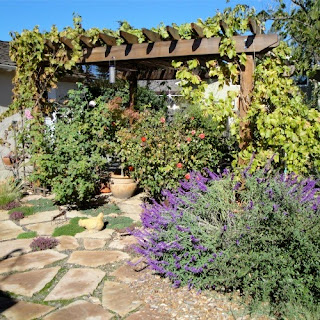This is my third year as a
volunteer organizer for the annual
Edible
Landscaping Tour organized by
Common Ground Organic
Garden Supply and Education Center (Saturday July 21, in the SF Bay Area -
register here ). Seasoned gardeners know that
besides getting your hands in the dirt, the best way to learn about gardening
is from other gardeners.
This summer consider going on an
edible gardens
tour, even if you have to organize it yourself.
Can't Find an Edible Gardens Tour Near You? DIY
Summer is the perfect season to visit
local gardens
and get tips and ideas
directly from the gardeners themselves. The goal is to
see a diversity of approaches to landscaping with edibles, and to come away
with great ideas that you can adapt to your situation.
But if you can’t find a tour in your area consider
organizing an informal garden tour in your neighborhood. Most avid gardeners
love to show their gardens and share their experiences. All you have to do is
ask.
 |
| Edible Landscaping in this suburban front yard |
Ten Tips for Organizing an Edible Gardens Tour
1. Decide what features the gardens should have to make the
cut for your tour: organic practices only? examples of wise water use, composting,
etc? edibles in both the front and backyards?
2. Location and scope: will it be restricted to walking or
biking distance only? carpooling? Who will attend?
3. Send out a call for gardens through your neighborhood
newsletter or community bulletin boards (both virtual and actual) and social
media. Do a walk-around or bike ride to spot gardens with edibles in the front
yard. Chances are good that they have more in the backyard.
4. When you've found eligible gardens and willing hosts,
visit each garden to make sure it fits your expectations for your tour.
5. Be clear on what the garden hosts are expected to do,
such as answering questions and explaining their approach to growing food. Of
course, they must be willing to have a certain number of people traipsing
though their garden on the appointed day, and commit to being available at the
time of the tour.
 |
| Thompson Seedless grapes in abundance on our grape arbor |
6. Organize your tour as far in advance as possible.
Enthusiastic gardeners will want to showcase their gardens in the best possible
manner so having lead-time to plan is appreciated, plus you'll need time to get
the word out to recruit attendees.
7. For an informal tour you can visit the gardens as a
group within a neighborhood, one garden at a time. Make sure everyone knows
ahead of time how much time will be allotted at each stop. It’s easy to
get carried away and spend too much time at one garden and not have enough left
for the others!
8. If your tour is larger in scope and you have lots of
attendees planned, arrange to have a pre-tour in advance for the gardeners
showing their gardens, so that they’ll have a chance to visit each other’s
gardens.
9. For a neighborhood tour a potluck or tomato tasting is
the perfect way to end the event and have more time to socialize.
10. Plan for next's year's tour: keep a list of the current
participants and another list for gardens for the following years' tour.
Gardeners who couldn't participate this time may be willing and ready next
year. Create an online photo album to share and encourage the participants to post
their photos and comments.
The 6th annual Edible Landscaping Tour organized by Common Ground Organic
Garden Supply and Education Center takes place on Saturday July 21st,
from 11am to 4pm.
You can register now online.
This tour is located on the San Francisco Peninsula and is
a fantastic one day tour of ten local gardens that feature landscaping
with edibles and gardening by sustainable methods, including: composting, wise
water use, and even raising chickens for eggs and manure. This popular event
attracts hundreds of attendees each year.
Photos: Patricia Larenas, Urban Artichoke















